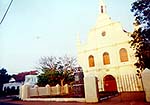


|
|
 |
| HOME | TRAVEL | TRAVELOG | ||

Within God's Country ... a newcomer's impressions of Cochin Theresa Varghese. Photographs V Sunny Try a set mundu if you're female and a double veshti if you are male. The range here is mindboggling. Prices start at Rs 300 and go up to steep Rs 17,000. Why is it so expensive? And the material is all cotton? Due to the zari used. The more intricate the zari work, the higher the price. Settle for a simple one for there's nothing cooler than a fine cotton dhoti in the clammy heat of Cochin.
Ernakulam ends at Thevara from where Venduruthy bridge connects the town to Willingdon Island. A totally man-made piece of land, created from the dredging of the harbour, courtesy Robert Bristow -- erstwhile chief engineer of the port -- Cochin harbour is believed to be amongst the finest natural ones in the world. Besides scenic views from various vantage points and the airport, for tourists the island is basically a thoroughfare connecting one part of the mainland to another part of the mainland, Mattancherry, the part of Cochin where old-timers reside.
The biggest attraction here is the synagogue. Built in the 15th century, it is a structure that is an enduring symbol of a community. A looksee inside is a memorable experience but do be careful of the merchants hawking their wares in the narrow lanes nearby. You can get ripped off if you're the gullible sort. One shop worth visiting,, however, is Idiom, the bookstore run by an expatriate. The handwritten sign outside is appropriate -- Dangerously good books. So! Enter with care. You could get hooked. Close to Jew Town is the Dutch Palace, once the home of the Raja of Cochin and now of academic interest to those inclined to stuff like murals and palanquins. But go on further to Fort Cochin and you will come to the beach where stand the Chinese fishing nets, framed for posterity on every travel brochure selling Cochin. Believed to have been brought to Kerala by Chinese traders, the continuing use of these giant nets by local fishermen is a reminder of the rich trade in gold, ivory and spices that this coastal town was once involved in.
Fort Cochin is truly colonial India. Except that, unlike other parts of the country where it was the British who left their mark, the nooks and corners here speak of the Portuguese and the Dutch, both of whose bastion it once was. St Francis Church and Vasco da Gama's burial place notwithstanding, Fort Cochin has, to put it simply, character. That many consider it a great place to explore is obvious from the scores of European budget travellers who take up lodgings here. Currently their nodal point for meeting and exchanging views is Kashi, a fairly new café on Burgher street. Run by Anup and his American wife Karuna, Café Kashi is become well known for its coffee and cakes and for the simple, easy-on-pocket continental breakfast and lunch they do. The café also holds art exhibitions periodically. Is Kashi going to become another Leopold of the 70s (the one and only in Bombay) Quite, quite possible.
Oh, and about those tourist brochures. Take them with a pinch of salt. You do see flashes of paradise, courtesy God. But with so many man-made monstrosities how can even He hope to win?
|
|
| Back
|
|
|
|
|
|
HOME |
NEWS |
BUSINESS |
CRICKET |
MOVIES |
CHAT
INFOTECH | TRAVEL | LIFE/STYLE | FREEDOM | FEEDBACK |
|